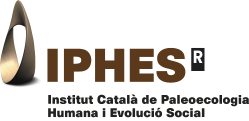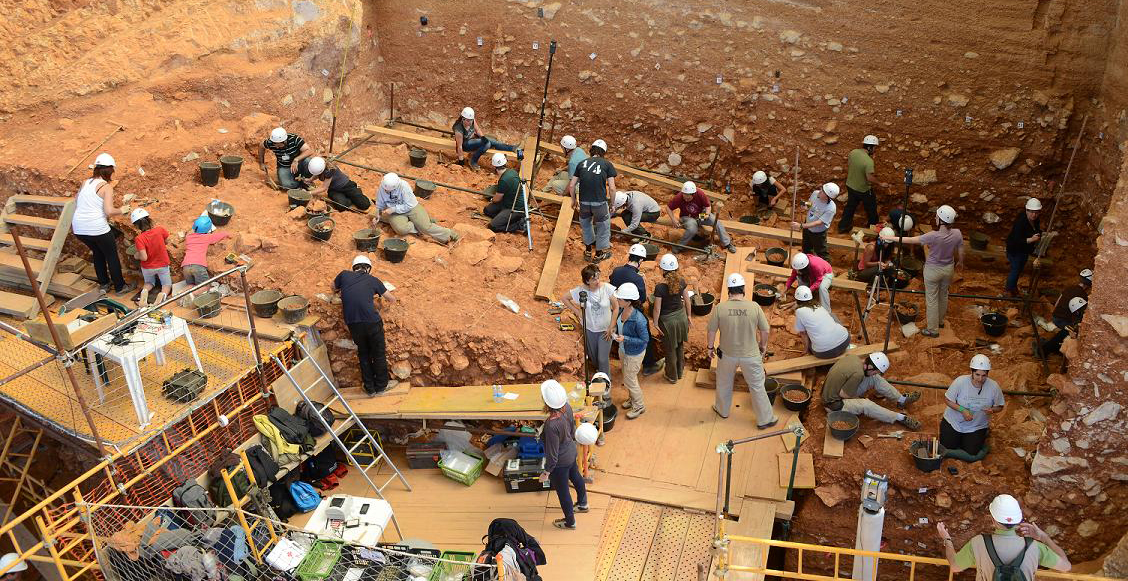
Subsistence, Technology and Human Evolution

Title: Social, Cultural and Biological Evolution during the Pleistocene (StEP)
Coordinator: Dr. Andreu Ollé![]()
Call: Ajuts per donar suport a les activitats dels grups de recerca de Catalunya (SGR-Cat 2021)
Funder: Agència de Gestió d'Ajuts Universitaris i de Recerca (AGAUR)
Period: 01/01/2022 - 31/12/2024
Reference Code: 2021 SGR 01239 (double filiation IPHES-URV Group)
Researchers: Dr. Mikel Arlegi, Dr. Adrián Arroyo, Dr. Amèlia Bargalló, Dr. Guillermo Bustos, Dr. Constantino Buzi, Dr. Eudald Carbonell, Dr. Joana Gabucio, Dr. Beatriz Gamarra, Dr. Paula García-Medrano, Dr. Phil Glauberman, Dr. Raquel Hernando, Dr. Rosa Huguet, Dr. Federica Landi, Dr. Carlos Lorenzo, Dr. Marina Lozano, Dr. Jordi Marcé, Dr. Marina Mosquera, Dr. Carmen Rissech, Dr. Xosé Pedro Rodríguez, Dr. Antonio Rodríguez-Hidalgo, Dr. Palmira Saladié, Dr. Alessio Veneziano, Dr. Josep Maria Vergès.
PhD students: Pamela Akuku, Andion Arteaga, Antonietta Del Bove, Andrea Díaz, Francesc Marginedas, Mario Marqueta, Paula Mateo, Chiara Messana, Clara Mielgo, Miguel Ángel Moreno, Míriam Salas, Alfredo Suesta, Noé Valtierra, Görkem Cenk Yeşilova.
Support to research staff: Dr. Lucía López-Polín, Anna Francès, Maria Dolors Guillén, María Martínez, David Miró, Javier Sopesens, Andrea Alías.
Collaborations: (affiliated researchers) Dr. Lena Asryan, Dr. Juan Luis Fernández, Dr. Diego Lombao, Dr. Juan Marín, Dr. Julio Mercader, Dr. Antonio Pineda, Dr. Gizéh Rangel de Lázaro, Dr. Boris Santander, Dr. Laxmi Tumung.
Summary: StEP group aims to study Human Evolution on its biological, social, and technological developments in the Pleistocene (although younger contexts are also studied). The main areas of research are palaeoanthropology, zooarchaeology and taphonomy, lithic technology, early human cognition (primate archaeology and cognitive technology), and preparation and conservation of archaeo-palaeontological materials.
The scientific approach relies heavily on fieldwork, the systematic preparation and analysis of archaeological materials to get reliable empirical data, and actualism and experimentation as methods for formulating and contrasting explanatory hypotheses. All of this enables a critical debate and creative additions to the interpretative methodologies.
Our main interest is focused on the palaeoecological connections between biological and cultural evolution, especially in the context of early European human settlement. From fieldwork to publication of results, the strategy is interdisciplinary in nature and involves research, teaching, and socialisation of knowledge.
Objectives and research lines:
The shared objective of the group is the study of human evolution during the Pleistocene, for which special focus is posed on the following domains of research:
1. Lithic technology
- Technological and morphometrical analysis of the litho-technical assemblages from the Pleistocene sites directly excavated by the research group or available thanks to its international network.
-
Redefining key issues of the European Pleistocene technocomplexes regarding 3 key moments: a) from the first Mode 1 evidence until the appearance and diffusion of the early Acheulean; b) the roots of the Middle Palaeolithic; and c) the appearance of the early Upper Palaeolithic.
-
Interpretation of site formation processes and occupational models basing on the spatial and technological dimensions of the lithic refitting.
-
Application of multi-technique and multi-scalar microwear and residues analyses (including optical, 3D digital, scanning electron, and confocal microscopes as well as vibrational spectroscopy) to archaeological assemblages.
-
Introduction of the formal modelling in the study of the diffusion of technology.
2. Cognitive archaeology
- Primate archaeology: study of extant primate tool-use and toolmaking behaviours by applying interdisciplinary and non-invasive methodologies (technological, functional analysis, chaîne opératoire, cognitive processes and behavioural observations). Development of models for human evolutionary studies to interpret the processes involved in the origins of technology.
- Cognitive technology: study of the cognitive aspects of Pleistocene lithic technology, such as the emergence, management, and evolution of the concepts of symmetry, volume, standardization, and mental templates to manage the role of raw materials in the knapping processes of the Oldowan, the Acheulean, and the Mousterian.
3. Zooarchaeology and taphonomy
- Paleoeconomic and paleoecologic relations between hominins and other animals of the paleoecosystem.
- Study of the subsistence strategies, animal resources supply models and strategies, tactics, and techniques of hunting from a social and evolutionary perspective.
- Analysis of the territorial coexistence (regional and intrasite) of hominins and carnivores in the European Pleistocene, to establish levels of competition or symbiosis between both paleoguilds.
- Extension of the experimental works on the origin and/or modification processes of the archaeological assemblages and their taphonomic signal according to an uniformitarianist perspective.
- Forensic taphonomy studies to expand our knowledge of human cannibalism and violence in Prehistory.
- Taphonomic, technological and functional research in relation to Pleistocene bone technology.
4. Palaeoanthropology
- Palaeobiological studies from paleoanthropological remains (dental, cranial and postcranial remains) focusing on aspects about diet, sexual dimorphism, hearing capabilities, encephalization, anatomical integration, biological affinities, dental pathologies, evolvability and human adaptation through evolution processes in the Pleistocene and Holocene.
- Analysis of the neandertalisation evolutive process using different hominin specimens from sites included in the project.
-
Application of microscopic and 3D methods (SEM, confocal, 3D microscopy, microCT, surface scanner, photogrammetry and geometric morphometrics) for the palaeobiological and morphological study of human fossils and recent past populations.
-
Computational biomechanics models and functional analysis of paleoanthropological remains to study the evolution of the hominin and primate lineage.
5. Conservation of archaeological materials
- Study the effectiveness of different consolidation products and application method: a) analysis of the changes on the chemical composition and structure before and after the treatments (by mercury intrusion porosimetry, microscopic observation of thin sections, ATR-FTIR); b) study of mechanical properties by material essays (microhardness test, etc.).
- Assessment of the effects of cleaning techniques on the surface of bone remains by microscopic and 3D (SEM, confocal, 3D microscopy, microCT, and surface scanner), as well as surface mechanical properties.
- Criteria for conservation of skeletal remains and lithic artefacts: analysis of conservation methods from the field to the research and proposal of new criteria for different remains and research needs (e.g., technological, taphonomical, biomolecular).
The research topics of this group share the same general empirical framework based on the different fieldwork projects led or specifically participated by their members, both in Spain and abroad. Those projects include:
In Spain:
- The archaeo-paleontological complex of the Sierra de Atapuerca (Burgos), especially the Pleistocene cave sites of Sima del Elefante, Gran Dolina, Galería, Sima de los Huesos and Cueva Fantasma, as well as the Pleistocene- Holocene site of El Mirador.
- The Pleistocene sites of the Calerizo de Cáceres (Cáceres): Cueva de Santa Ana and Cueva de Maltravieso.
- The Pleistocene and Holocene sites included in the project “Evolució paleoambiental i poblament prehistòric al Projecte Francolí, Gaià, Siurana i rieres del camp de Tarragona”: Barranc de la Boella, la Cansaladeta, Cova dels Xaragalls, les Borres, La Cativera, Cantacorbs, Cova del Cudó, El Cavet, Cova de la Font Major, La Bauma de la Vall, and Mas d’en Llort (Tarragona).
- The Upper Pleistocene site of Abric Romaní (Barcelona).
- The Upper Pleistocene sites of Balma de la Griera (Tarragona), Cova Foradada (Tarragona), Cova del Mas Trader (Barcelona), Cova del Parco (Lleida), Cova Foradà (Valencia), Cova de Dalt del Tossal de la Font (Castelló de la Plana), Abauntz cave (Navarra), Cueva del Polvorín (Bizcaya), Abrigo de Navalmaíllo and Cueva Des-cubierta at Pinilla del Valle (Madrid), La Malia (Guadalajara), Cueva del Castillo (Santander), El Sidrón (Oviedo), and Cova Eirós (Lugo).
- The Holocene sites of Guixeres de Vilobí (Barcelona), Roc de les Orenetes, Bauma dels Fadrins and Torrent de l’Estremera (Girona).
International:
- The Plio-Pleistocene sites of Danakil (Eritrea), the Pliocene, Lower and Middle Pleistocene sites of Aïn Béni Mathar-Guéfaït (Morocco), the Early to Middle Pleistocene sites of Engaij Nanyori and Bed Ndutu at Olduvai Gorge (Tanzania), and the Middle Pleistocene site of Kanyimangin (Kenya), the Holocene Mahal Teglinos site (Sudan).
- Pleistocene Hominin Occupation in the Kura-Arax depression and in the Vorotan River Valley (South Caucasus), including the Areni1 & Areni2 caves (Armenia).
- The Middle Pleistocene site of Notarchirico (Italy), the Upper Pleistocene - Holocene sites in the Madonie Park (Sicily, Italy).
- Study of the Stone Technology used by capuchin monkeys from Serra da Capivara (Brazil) and study of the technological behaviour of chimpanzee communities at Dindefelo (Senegal).
StEP aims to consolidate and strengthen the ongoing transfer actions related to heritage enhancement of the archaeological sites as cultural and touristic items of the region where these are located. Indeed, the research lines of the group will continue to feed the Atapuerca System actively collaborating with stakeholders such as Museo de la Evolución Humana and Fundación Atapuerca. The group is involved in the heritagisation process of Barranc de la Boella archaeological site (Tarragona) by executing the operation “Mamut” as a part of the “TurisTic en família” (FEDER-RIS3CAT) in collaboration with Diputació de Tarragona and Ajuntament de la Canonja. A similar process is being launched at the interpretation centre of NEAN-Parc Prehistòric de Capellades, in collaboration with Ajuntament de Capellades and Diputació de Barcelona. Finally, a Master Plan for the heritage enhancement of the Paleolithic engravings of Font Major cave is being developed in collaboration with Ajuntament de l’Espluga de Francolí and other regional public bodies.